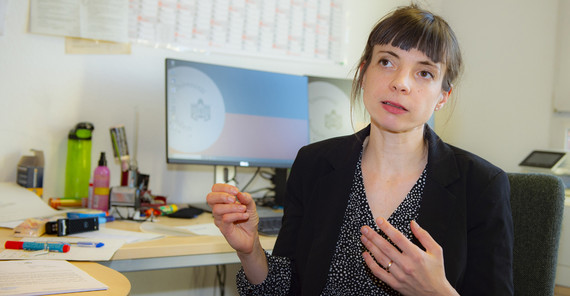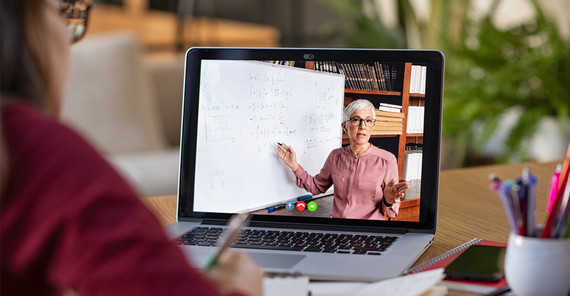One of my son’s teachers – my son is in 6th grade – set up an email address of necessity in the wake of the first lockdown in 2020 and to this day uploads jpegs of photos from 20-year-old workbooks into a frequently overloaded Brandenburg school cloud. In your opinion, is this an exception or the rule?
There have been many similar reports over the past year. In our online survey, which we conducted in early summer 2020 with about 1,000 teachers, most of them reported that they frequently communicated with their students via email. Other studies have confirmed this result. A study at TU Dortmund, for which 2,600 parents were surveyed between April and June 2020, showed that teachers, according to the parents, often sent tasks and only rarely got in touch personally. On the other hand, current online surveys of the “German School Barometer” reveal that the options available to teachers have changed a lot since last year: For example, they rely more on digital learning platforms to communicate with their students. So overall, the situation is highly dynamic. I really understand how frustrated many parents feel about the situation, but I think it is important to appreciate one another and to acknowledge that everyone involved – parents, teachers, principals, and education policy makers – are doing a lot, within their possibilities, in order to deal with the challenges of the current situation as best as they can. A lot is changing in the educational system, and teachers especially need the support of their schools to master these changes.
Are teachers in Germany digitally competent enough to prepare students for a future in a digitalized world – or are they not, in fact, teaching in front of a class of about 25 “digital natives”?
In the working group School Education at the University of Potsdam, we examine the question of digital competence self-assessments in-depth. My colleague Dr. Charlott Rubach, who is currently working at the University of California, Irvine, and I, for example, were able to show that student teachers in Germany judge themselves quite accurately in areas like “Communication and Cooperation” or “Producing and Presenting” with digital media but that there is room for improvement in the area “Problem Solving and Acting” with digital media. And teachers, too, face the challenge of refining their competencies in the digital field – which is why the Center for Teacher Training and Education Research (ZeLB) at the University of Potsdam founded the graduate college DiCTaT this year. Among other questions, it explores how digital technologies can be used in and for the continuing education of teachers.
To what extent can digital competencies be taught and promoted as part of teacher training?
It is our goal, on the one hand, to convey professional knowledge but, on the other hand, to also promote the application of knowledge to the teaching context. The question, above all, is which settings and processes of teaching and learning are particularly successful in teacher training when it comes to imparting digital competencies. Together with the geography didactics expert Professor Nina Brendel, we examined this in a small project. We were able to prove that different foci in the seminars each promoted different competencies. In seminars in which digital media were used strategically for course planning and development, students later said they had gained competencies in „Communicating and Cooperating“, “Problem Solving and Acting“, and “Teaching and Implementing”. Seminars in which students took the perspective of teachers and used digital media to solve tasks in a seminar context yielded higher assessments regarding “Communicating and Cooperating”, ”Protecting and Acting Safely”, and ”Problem Solving and Acting” at the end of the semester – not, however, regarding “Teaching and Implementing”.
Since many schools don’t actually have the necessary IT equipment, can we say anything at all about the competence of teachers?
Of course, the technical equipment of schools is an important starting point for developing teachers’ digital competencies, but it isn’t the only one. A recent study, which we conducted with Prof. Dirk Richter from the department of Pedagogical Education Research, does show that the technical equipment of schools matters for the self-efficacy of teachers as they handle digital media. But cooperation among colleagues, that is, an exchange on digital media and how to handle them, is also important. And, of course, further training courses play an important role in this field. Cooperation was especially important in our study because it was directly related to how teachers managed contacts during distance learning necessitated by COVID-19. Teachers who talked with colleagues about how to manage digital media in distance learning were more likely to contact their students while schools were closed and felt overall better prepared for the situation. So to sum up, it seems to be very important for teachers to communicate with one another, to work together, and to establish strategic collaboration in school when it comes to using digital media in their teaching.
How do you determine this competence?
In the study I just mentioned, we examined self-efficacy when dealing with digital media – that is, the question to what extent teachers are confident enough to integrate digital media into their teaching in the future, even when problems or difficult situations arise in the process. Overall, however, what we mean by digital competencies is much broader and includes the successful mastering of tests on how to handle digital technologies (ICT literacy) as well as self-assessments of competence in various areas like Searching, Protecting, Storing, and Teaching, as described, for example, in the EU framework model “DigCompEdu”
Sometimes one can get the impression that a lack of digital competence is intergenerational. Are such competencies, tailored to digital innovations, not adequately taught in teacher training?
In some cases this might be true. But our results suggest that the age and work experience of teachers also influence how they assess their own digital competencies. Teachers who have been in the profession for longer und whose own training dates further back described themselves – in our survey – as less digitally competent. Surely, this is also due to the fact that teacher training is now taking up this topic much more than before.
The Researcher
Prof. Dr. Rebecca Lazarides studied education at Freie Universität Berlin and completed her doctorate at Technische Universität Berlin on teaching and the interests of students in the subject of mathematics. Between 2016 and 2021, she was junior professor, and in 2021 she became a full professor for school pedagogy with a focus on the development of schools and curricula at the University of Potsdam.
Mail: rebecca.lazaridesuuni-potsdampde
The Project
Digital Learning – Competencies of Teachers, Course Quality, and Distance Learning during COVID
Data collection period: May/June 2020
https://www.uni-potsdam.de/de/schulpaedagogik/projekte-in-forschung-und-lehre/forschungsprojekte/digikompel-einschaetzung-digitaler-kompetenzen-bei-lehramtsstudierenden-und-lehrkraeften
This text was published in the university magazine Portal Wissen - Two 2021: Departure (PDF).


